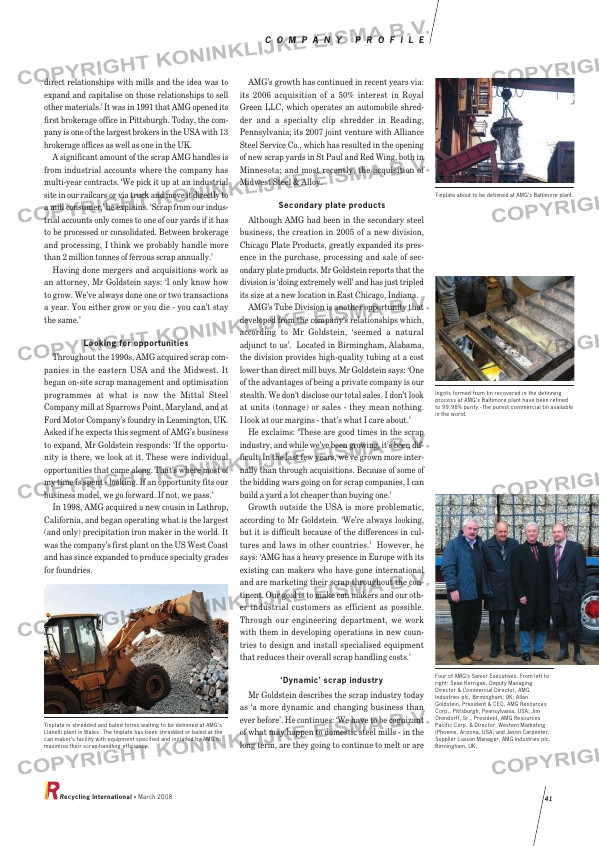Page 41 from: March 2008

direct relationships with mills and the idea was to
expand and capitalise on those relationships to sell
other materials.’ It was in 1991 that AMG opened its
first brokerage office in Pittsburgh. Today, the com-
pany is one of the largest brokers in the USA with 13
brokerage offices as well as one in the UK.
A significant amount of the scrap AMG handles is
from industrial accounts where the company has
multi-year contracts. ‘We pick it up at an industrial
site in our railcars or via truck and move it directly to
a mill consumer,’ he explains. ‘Scrap from our indus-
trial accounts only comes to one of our yards if it has
to be processed or consolidated. Between brokerage
and processing, I think we probably handle more
than 2 million tonnes of ferrous scrap annually.’
Having done mergers and acquisitions work as
an attorney, Mr Goldstein says: ‘I only know how
to grow. We’ve always done one or two transactions
a year. You either grow or you die – you can’t stay
the same.’
Looking for opportunities
Throughout the 1990s, AMG acquired scrap com-
panies in the eastern USA and the Midwest. It
began on-site scrap management and optimisation
programmes at what is now the Mittal Steel
Company mill at Sparrows Point, Maryland, and at
Ford Motor Company’s foundry in Leamington, UK.
Asked if he expects this segment of AMG’s business
to expand, Mr Goldstein responds: ‘If the opportu-
nity is there, we look at it. These were individual
opportunities that came along. That’s where most of
my time is spent – looking. If an opportunity fits our
business model, we go forward. If not, we pass.’
In 1998, AMG acquired a new cousin in Lathrop,
California, and began operating what is the largest
(and only) precipitation iron maker in the world. It
was the company’s first plant on the US West Coast
and has since expanded to produce specialty grades
for foundries.
Recycling International • March 2008 41
C O M P A N Y P R O F I L E
AMG’s growth has continued in recent years via:
its 2006 acquisition of a 50% interest in Royal
Green LLC, which operates an automobile shred-
der and a specialty clip shredder in Reading,
Pennsylvania; its 2007 joint venture with Alliance
Steel Service Co., which has resulted in the opening
of new scrap yards in St Paul and Red Wing, both in
Minnesota; and most recently, the acquisition of
Midwest Steel & Alloy.
Secondary plate products
Although AMG had been in the secondary steel
business, the creation in 2005 of a new division,
Chicago Plate Products, greatly expanded its pres-
ence in the purchase, processing and sale of sec-
ondary plate products. Mr Goldstein reports that the
division is ‘doing extremely well’ and has just tripled
its size at a new location in East Chicago, Indiana.
AMG’s Tube Division is another opportunity that
developed from the company’s relationships which,
according to Mr Goldstein, ‘seemed a natural
adjunct to us’. Located in Birmingham, Alabama,
the division provides high-quality tubing at a cost
lower than direct mill buys. Mr Goldstein says: ‘One
of the advantages of being a private company is our
stealth. We don’t disclose our total sales. I don’t look
at units (tonnage) or sales – they mean nothing.
I look at our margins – that’s what I care about.’
He exclaims: ‘These are good times in the scrap
industry, and while we’ve been growing, it’s been dif-
ficult. In the last few years, we’ve grown more inter-
nally than through acquisitions. Because of some of
the bidding wars going on for scrap companies, I can
build a yard a lot cheaper than buying one.’
Growth outside the USA is more problematic,
according to Mr Goldstein. ‘We’re always looking,
but it is difficult because of the differences in cul-
tures and laws in other countries.’ However, he
says: ‘AMG has a heavy presence in Europe with its
existing can makers who have gone international
and are marketing their scrap throughout the con-
tinent. Our goal is to make can makers and our oth-
er industrial customers as efficient as possible.
Through our engineering department, we work
with them in developing operations in new coun-
tries to design and install specialised equipment
that reduces their overall scrap handling costs.’
‘Dynamic’ scrap industry
Mr Goldstein describes the scrap industry today
as ‘a more dynamic and changing business than
ever before’. He continues: ‘We have to be cognizant
of what may happen to domestic steel mills – in the
long term, are they going to continue to melt or are
Tinplate in shredded and baled forms waiting to be detinned at AMG’s
Llanelli plant in Wales. The tinplate has been shredded or baled at the
can maker’s facility with equipment specified and installed by AMG to
maximise their scrap-handling efficiency.
Tinplate about to be detinned at AMG’s Baltimore plant.
Ingots formed from tin recovered in the detinning
process at AMG’s Baltimore plant have been refined
to 99.98% purity – the purest commercial tin available
in the world.
Four of AMG’s Senior Executives. From left to
right: Sean Kerrigan, Deputy Managing
Director & Commercial Director, AMG
Industries plc, Birmingham, UK; Allan
Goldstein, President & CEO, AMG Resources
Corp., Pittsburgh, Pennsylvania, USA; Jim
Orendorff, Sr., President, AMG Resources
Pacific Corp. & Director, Western Marketing
(Phoenix, Arizona, USA; and Jason Carpenter,
Supplier Liaison Manager, AMG Industries plc,
Birmingham, UK.
RI_027 Comp. profile:Opmaak 1 28-02-2008 15:30 Pagina 41



